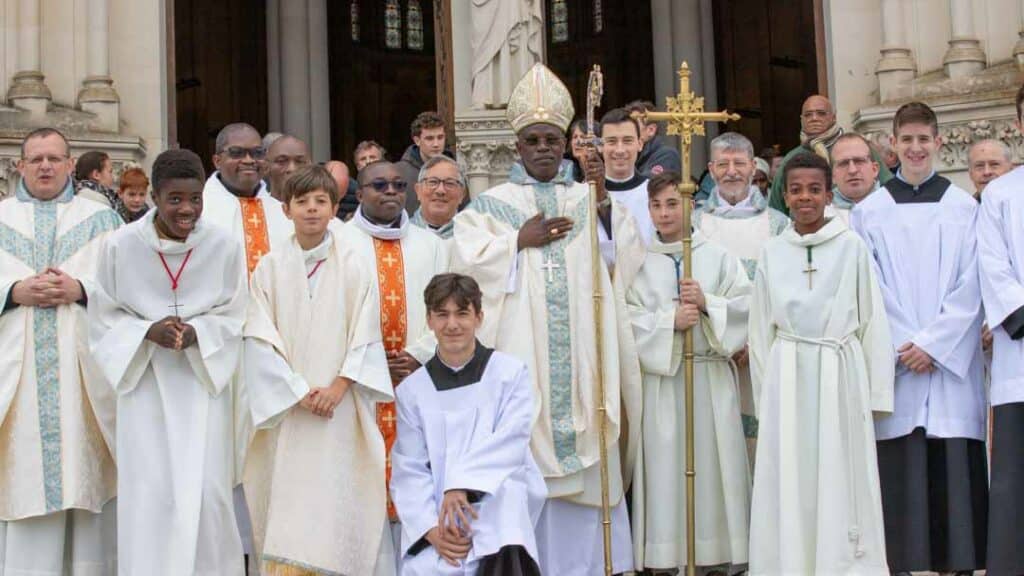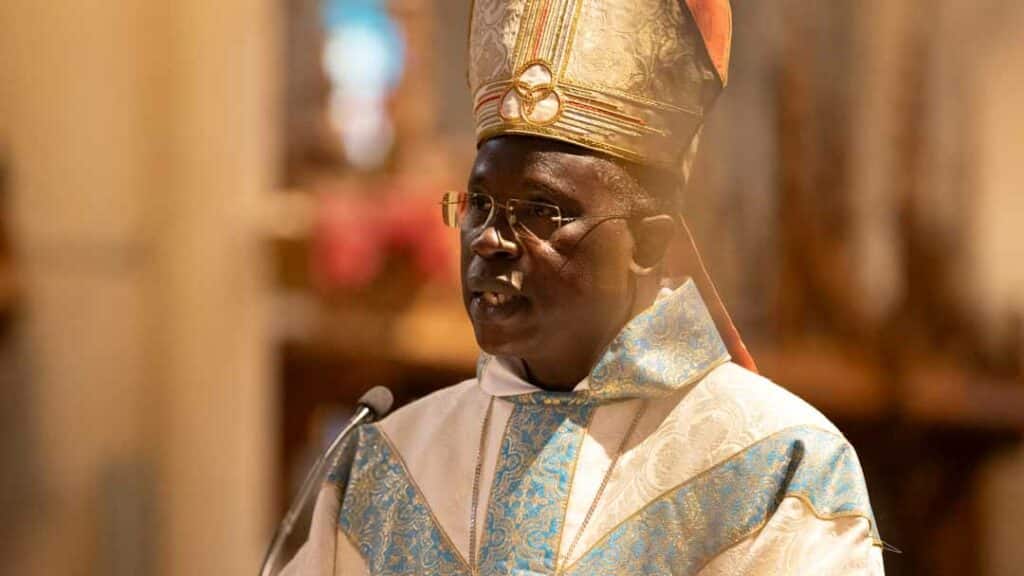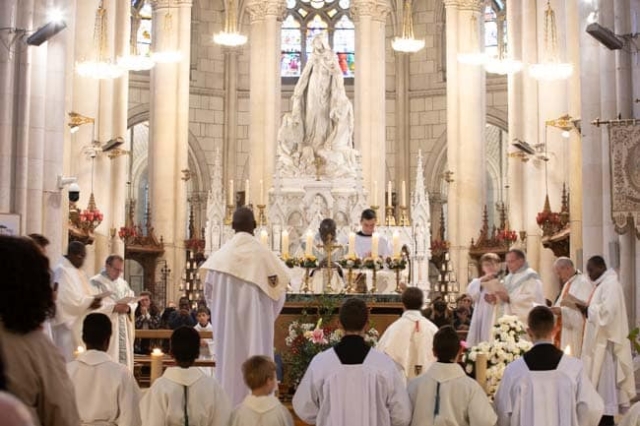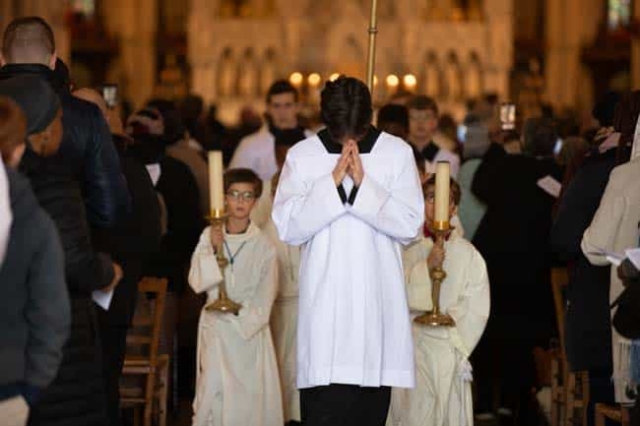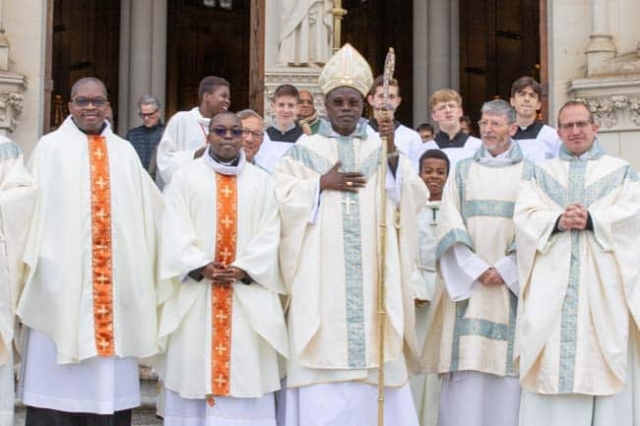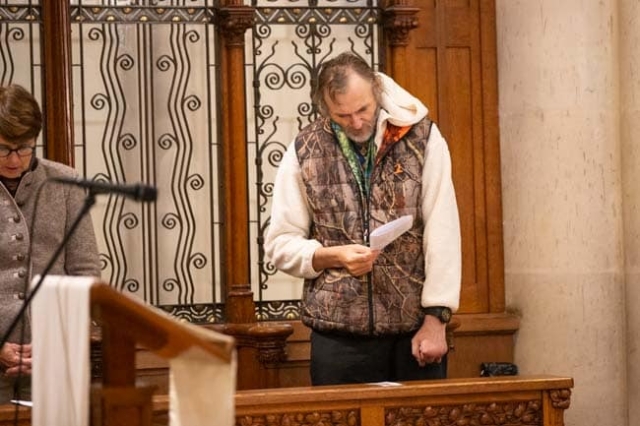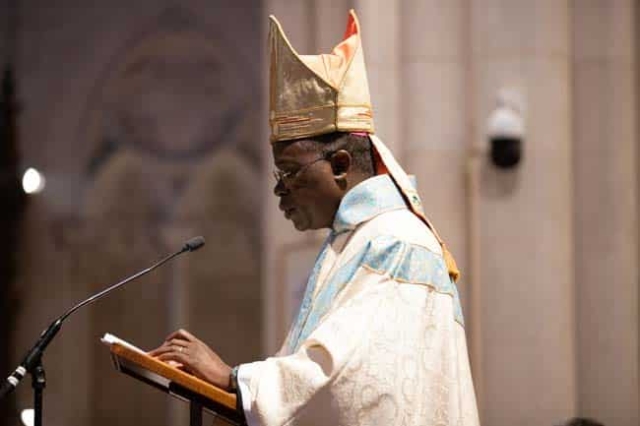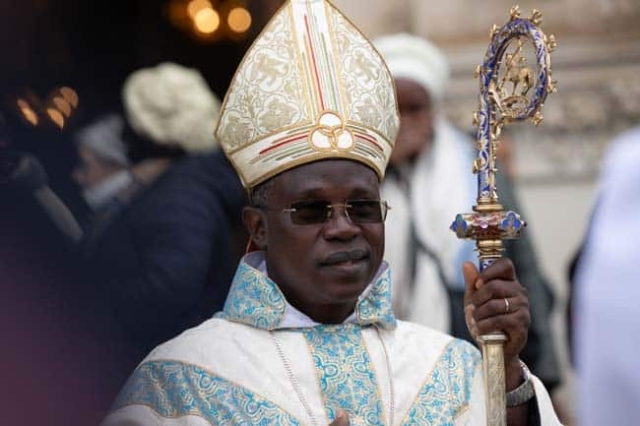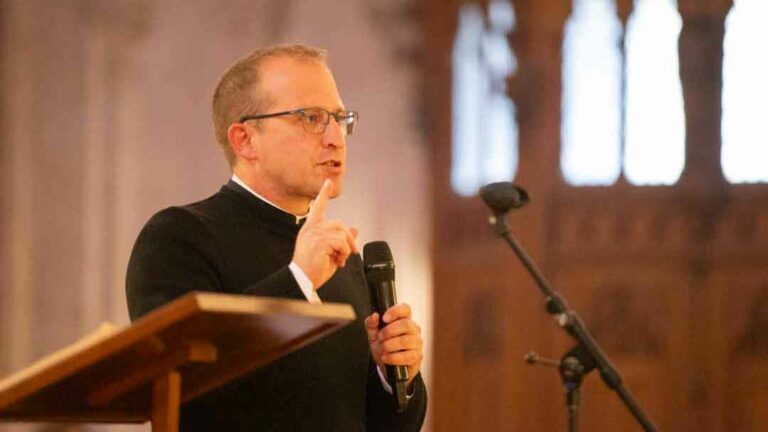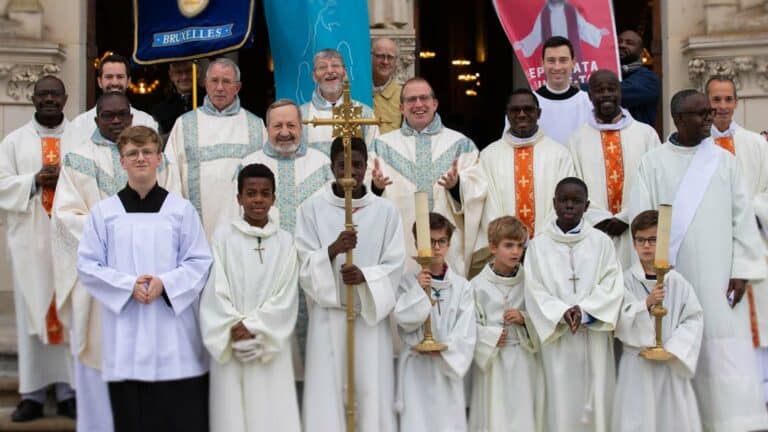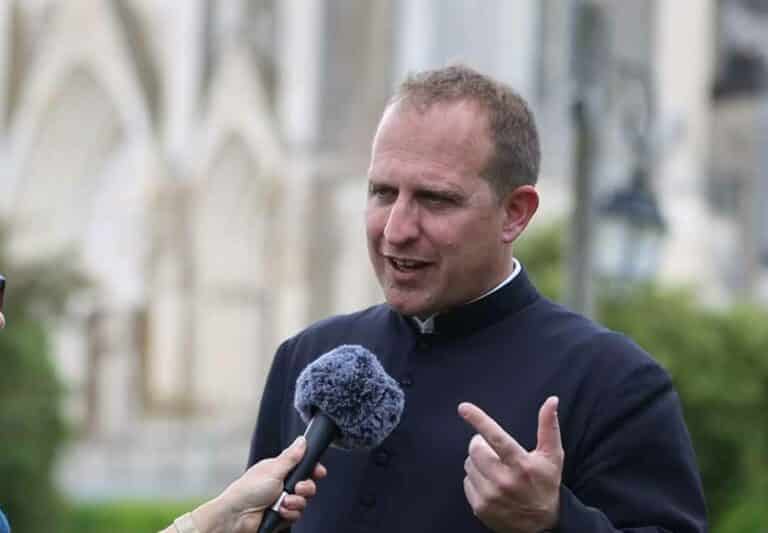The following is the full script of an homily given by Mgr Aristide Gonsallo, bishop of Porto-Novo in Benin, at the Mass of the pilgrimage on Nov. 3, 2024.
“Dear Reverend Father Paul Denizot, rector of this unique place in the world dedicated to prayer for the dead,
Reverend chaplain fathers of this shrine,
Dear concelebrating fathers
All you religious men and women on mission at this shrine,
Dear brothers and sisters in Christ who have come as pilgrims,
Here we are, gathered at the foot of Notre-Dame de Montligeon, Our Lady Liberator, on this first Sunday in November, the day after the solemnity of All Saints’ Day, for our Pilgrimage of Heaven. First of all, I’ would like to express my gratitude to Don Paul Denizot for his invitation and for the two visits he made to my diocese in Porto-Novo, Benin. Myself, this is the first time I have officially set foot on the soil of this key spiritual centre. I bless the Lord for the historical and providential link between my diocese and the shrine of Montligeon. Indeed, the diocese of Porto-Novo acts like the African cradle for the spirituality of the souls in purgatory linked to this Shrine here in France. Following the foundation of the Shrine, the first Notre-Dame de Montligeon associations were set up in 1923 at the Cathedral of Notre-Dame de l’Imaculéee Conception in Porto-Novo. Even then, these fraternities received letters from the Shrine, which they read and meditated on. I would like to pay tribute and venerate the memory of Monsignor Paul Joseph Buguet, founder of this beautiful ecclesial work. I am absolutely convinced that the influence of this Shrine and the increasing number of fraternities throughout the world are the fruits of Monsignor Buguet’s intercession, in communion with thousands of souls in purgatory who have finally reached heavenly bliss.
On this 31st Sunday of Ordinary Time in Year B, we live in remembrance of the celebrations of all the saints, and in memory of all our deceased brothers and sisters. Jesus Christ, whom we festively celebrate as “the Lord’s Day”, also wants us to pray with all those who, faithful to the Gospel as received and proclaimed, have already entered into the Joy of the Eternal Father.
On the day after All Saints’ Day, we place chrysanthemums in our cemeteries as symbols of pleasure and happiness. Not only do we pay tribute to all our deceased loved ones and relatives, but also to deceased people we don’t know. We wish them eternal bliss too, which is the seal of those who have been marked by the Lamb and judged worthy of seeing the book of life opened.
Dear brothers and sisters, on this first Sunday of the month dedicated to the souls in Purgatory, the liturgical texts are very relevant. Indeed, the Word of God that has just sounded in our ears reminds us that the whole of divine law consists in loving God and loving our neighbor. Following in the footsteps of the blessed, we believe that love is the only path that sanctifies us and leads us to heaven. According to the Gospel, love purifies us from all defilement. It makes us fit to meet the God who is Love. Failing to love leads us to Purgatory, where we let ourselves be educated in true, living love before we can experience the glory of Heaven. It is s a grace of light, on the threshold of Heaven, for those who lived in ignorance and for not having known or understood in time. Purgatory is a second opportunity that God offers to those he loves who have failed to grasp the grace of salvation during their earthly pilgrimage. The men and women we honored on All Saints Day have discovered love. They have adopted it as their way of life. If we are to become saints, we must embrace the demands of the first reading heard today: ‘You shall love the Lord your God with all your heart, with all your soul and with all your strength.‘ (Dt 6:2-6).
Similarly, in the Gospel, addressing the scribe who approaches him to get confirmation on the first of the commandments, Jesus’ reply is: ‘Listen, Israel: the Lord our God is the only Lord. You shall love the Lord your God with all your heart, with all your soul, with all your mind and with all your strength. And here’s the second: you shall love your neighbor as yourself.” From this answer I would like to draw our attention to two words. On the one hand, the word ‘listen’ and on the other, the phrase ‘as yourself’.
At the first stage of our meditation, we may point out that listening consists in welcoming the other into our heart. It also means learning to be silent, to let God speak to our hearts. In the first book of Kings, Solomon says: ‘Give me, Lord, a heart that listens’ (3:5-15). We need to welcome God when he speaks to us. Listening is a distinctive criterion of love. The word we hear must transform us completely. The Hebrew root of the verb “to listen” basically points to obedience. One proverb encapsulate this idea perfectly: ‘God gave us two ears and only one mouth to teach us that it is better to listen than to speak‘. The opposite of listening is indifference and disobedience. Listening is not a passive attitude. Rather, it is active in the sense that it requires the listener’s collaboration and availability. The word we listen to and meditate on must transform our lives and actions, changing the way we think and live.
Our heavenly Mother, the Blessed Notre-Dame de Montligeon, is a model of the heart that listens, making itself permanently available to Love. At the Annunciation, Mary was ready to listen, so that the Word of God could take its rightful place in all her dimensions as daughter and mother. When she didn’t understand the many events that marked the daily life of the Holy Family, she took the time to reflect on them in her heart. When a woman marvels at Jesus’ words, she says a prayer of blessing to him: Blessed is the woman who bore you in her womb, Jesus immediately corrects her: ‘Blessed are those who hear the word of God and keep it‘. The pair of words “hear and keep” means to listen, provided we hear well. To listen is to set out for good, in the highest practice of charity.
‘You shall love the Lord your God with all your strength, with all your soul, with all your mind and with all your heart‘. This commandment clearly shows that the Christian faith is neither a school of thought nor a philosophy. Rather, it is a loving encounter with Christ. It is He who sanctifies and delivers the most abandoned souls in Purgatory. If we have only an overly intellectual encounter with the Lord, he urges us today to learn to speak to God as we converse with a friend, or man to man. This is why Jesus became fully human, so that we could learn to love God. Because of this, He introduces us to communion with God and love of neighbor.
So the second point of our meditation leads us to Jesus’ words: ‘You shall love your neighbor as yourself‘. Jesus is talking about loving our neighbor. To love is to want and do good for one’s neighbor. The opposite of love is laziness, not hatred. To love is to make oneself available, to give of oneself to relieve suffering and make one’s neighbor happy. Which means that availability to others – in this case the neglected souls in Purgatory – is something that you build up every day. These souls are our invisible neighbors. To love our neighbor as ourselves is to learn to love them as they are. In other words, it means doing for others what we would like them to do for us.
This fundamentally is the basis for the work of the Shrine of Montligeon, which brings together priests from all over the world for the salvation of all the dead through the celebration of the Holy Sacrifice of the Mass. At each Mass celebrated for the departed, Jesus sets the souls free from Purgatory to let them enter the glory of Paradise. Those saved souls intercede for us in the everyday affairs of our lives. So let’s learn to love the souls of our departed ones, and we’ll benefit from a wealth of graces. Loving the souls in purgatory is not difficult. All it takes is a prayer for them, a mass offered for their salvation, an almsgiving for the repose of their souls, a visit to their family or grave, a candle lit to the Virgin Mary in their memory, and all the corporal and spiritual works of mercy that might relieve and deliver them.
In this shrine, we perpetuate All Saints’ Day daily as well as the commemoration of all the faithful departed by praying for them. We ask the Blessed Virgin Mary, Our Lady Liberator, to kindly carry our prayers and supplications to Jesus her Son, so that all the faithful departed may have the grace to wash and purify their garments, body and soul, in the Blood of the Lamb.
It is time now to set our gaze on Mary, Our Lady of Montligeon, Our Lady Liberator, in order to obtain for each of us who have come on this pilgrimage to Heaven, and for all those who participate in this mass through the various channels of communication, the grace to sing the Magnificat with all the blessed, one day. So, on this blessed day of our pilgrimage to Heaven, I raise with you the offering of this holy sacrifice of the Mass, not only for the deceased of our families, but also for each one of you. In the mystery of the Eucharist we celebrate, may we allow ourselves to be transformed by the presence of Jesus, who wants to reach each and every one of us, and who promises us eternal life.
To achieve this, we must invoke the Virgin Mary for this decisive hour of our passage. Indeed, by reciting the Ave Maria, we are rightly saying: Pray for us, now and at the hour of our death. If we learn every day to die as Mary learned from her Son Jesus, then we’ll have no more worries about what will happen to our human integrity after we die.
This is why I encourage you to join me in invoking Mary, Our Lady Liberator, through the prayer dedicated to her:
Our Lady Liberator
Have mercy on all our deceased brothers and sisters,
especially those most in need
of the Lord’s mercy.
Intercede for all those who have left us
so that the work of purifying love may be completed in them
.
May our prayer, united with that of the whole Church,
obtain for them the joy that surpasses all desire
and brings consolation and comfort
to our tried and distraught brothers and sisters.
Mother of the Church, help us, pilgrims of the earth,
to better live each day
our passage towards the resurrection.
Heal us of every wound of the heart and soul.
Make us witnesses to the Invisible,
already reaching out for the goods the eye cannot see,
apostles of hope
like the watchmen at dawn.
Refuge of sinners and Queen of all saints,
gather us all one day,
for the eternal Passover,
in the communion of the Father with Jesus, the Son,
in the Holy Spirit, for ever and ever.
Amen.”
